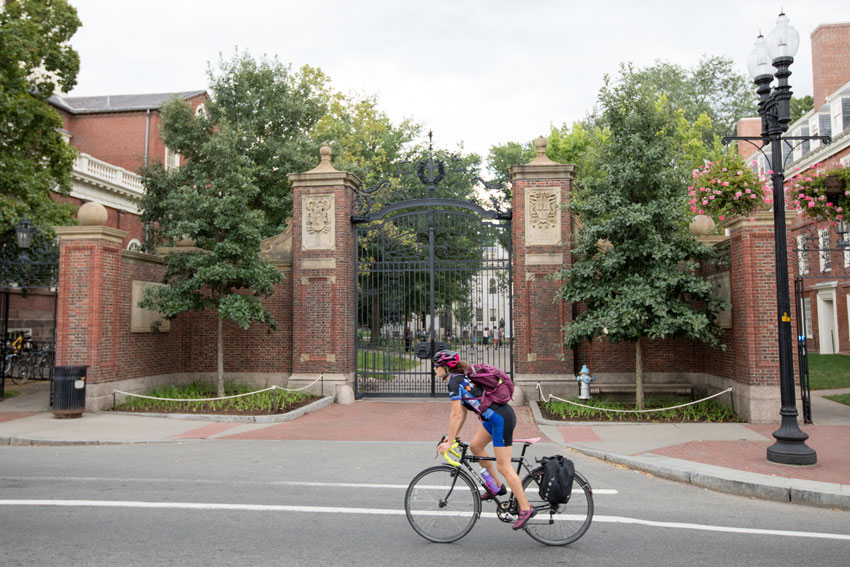Trump Administration Backs Asian American Students Alleging Discrimination at Harvard
A bicyclist rides past a gate to Harvard Yard at Harvard University, Aug. 30, in Cambridge, Massachusetts. The U.S. Justice Department sided with Asian Americans suing Harvard over admissions policy. (Scott Eisen/Getty Images)
The Trump administration, Aug. 30, backed Asian-American students who have filed a lawsuit against the Harvard University over the Ivy League institution’s alleged racial discrimination against them in its admission process, writes Lalit K. Jha.
The Justice Department filed a statement with a federal court alleging that the prestigious university has failed to demonstrate that it does not unlawfully discriminate against Asian-American students on the basis of race.
The Statement of Interest was filed in the ongoing case in federal court in Massachusetts. Students For Fair Admissions, an organisation of students and parents, filed a lawsuit in 2014, alleging that Harvard intentionally discriminates against academically strong Asian-American applicants when making admissions decisions.
Harvard, however, has said that it does not discriminate and will fight to defend its right to use race as a factor in admissions. It argued that its admission of Asian-Americans has risen 29 per cent over the last decade.
In the court filing, Attorney General Jeff Sessions today said, No American should be denied admission to school because of their race. As a recipient of taxpayer dollars, Harvard has a responsibility to conduct its admissions policy without racial discrimination by using meaningful admissions criteria that meet lawful requirements.”
This case is significant because the admissions policies at our colleges and universities are important and must be conducted lawfully, he said.
As a condition of receiving millions of dollars in taxpayer funding every year, Harvard specifically agrees to not discriminate on the basis of race in its admissions decisions, the Department of Justice said.
“However, the students and parents who brought this suit have presented compelling evidence that Harvard’s use of race unlawfully discriminates against Asian-Americans,” the Justice Department said.
In today’s filing, the US urges the court to grant the plaintiffs the opportunity to prove these claims at trial.
Under Supreme Court precedent, Harvard must demonstrate that its use of race does not result in illegal discrimination, it said.
Harvard has failed to do so, and the Department filed a Statement of Interest that argues the plaintiffs should be allowed to proceed to a trial, it said.
“While Harvard admits to using race in its admissions process, it has failed to provide any meaningful criteria to explain how it weighs race against other factors in a candidate’s application (e.g., test scores and extracurricular activities), and how it limits its use of race to ensure that no illegal discrimination occurs,” the Department of Justice said.
Supreme Court precedent requires Harvard to provide such an explanation, which it has failed to do in this case, it asserted.
In its filing, the Department of Justice said the evidence shows that Harvard uses a personal rating that may be biased against Asian-Americans.
Based solely on a review of the applicant’s file, Harvard scores its applicants based on “subjective” factors such as “likability” and being a “good person” with “human qualities”.
Harvard admits that, on average, it scores Asian-American applicants lower on this ‘personal rating’ than applicants of other races, Justice Department said in its court filing.
Substantial evidence also demonstrates that Harvard admissions officers and committees consistently monitor and manipulate the racial makeup of incoming classes, which has resulted in stable racial demographics in Harvard’s admitted classes from year to year, it alleged.
The Supreme Court has called such attempts to “racially balance” the makeup of a student body “patently unconstitutional”.


